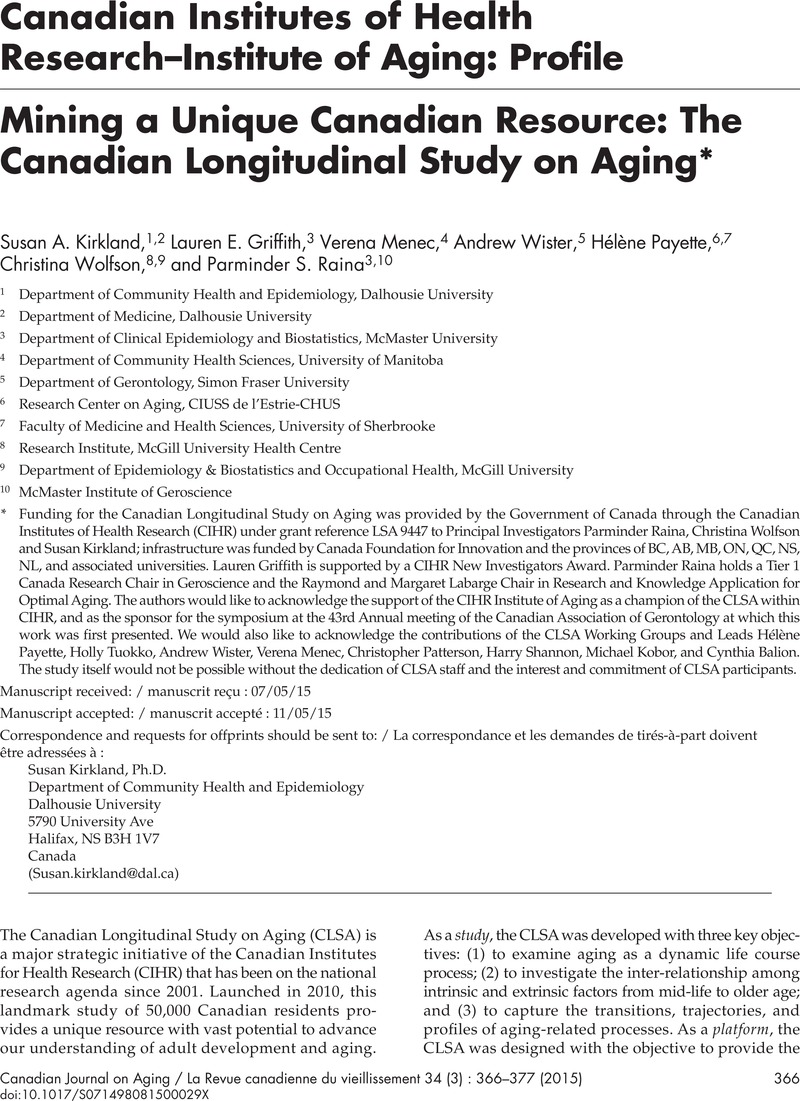Crossref Citations
This article has been cited by the following publications. This list is generated based on data provided by Crossref.
Levasseur, Mélanie
Dubois, Marie-France
Généreux, Mélissa
Menec, Verena
Raina, Parminder
Roy, Mathieu
Gabaude, Catherine
Couturier, Yves
and
St-Pierre, Catherine
2017.
Capturing how age-friendly communities foster positive health, social participation and health equity: a study protocol of key components and processes that promote population health in aging Canadians.
BMC Public Health,
Vol. 17,
Issue. 1,
García-Peña, Carmen
Espinel-Bermúdez, Claudia
Tella-Vega, Pamela
Pérez-Zepeda, Mario Ulises
and
Gutiérrez-Robledo, Luis Miguel
2018.
Aging Research - Methodological Issues.
p.
95.
Toohey, Ann M.
Hewson, Jennifer A.
Adams, Cindy L.
and
Rock, Melanie J.
2018.
Pets, Social Participation, and Aging-in-Place: Findings from the Canadian Longitudinal Study on Aging.
Canadian Journal on Aging / La Revue canadienne du vieillissement,
Vol. 37,
Issue. 2,
p.
200.
Bergeron, Julie
Doiron, Dany
Marcon, Yannick
Ferretti, Vincent
Fortier, Isabel
and
Beiki, Omid
2018.
Fostering population-based cohort data discovery: The Maelstrom Research cataloguing toolkit.
PLOS ONE,
Vol. 13,
Issue. 7,
p.
e0200926.
Costanian, Christy
Edgell, Heather
Ardern, Chris I.
and
Tamim, Hala
2018.
Hormone therapy use in the Canadian Longitudinal Study on Aging: a cross-sectional analysis.
Menopause,
Vol. 25,
Issue. 1,
p.
46.
Harasemiw, Oksana
Newall, Nancy
Shooshtari, Shahin
Mackenzie, Corey
and
Menec, Verena
2018.
From Social Integration to Social Isolation: The Relationship Between Social Network Types and Perceived Availability of Social Support in a National Sample of Older Canadians.
Research on Aging,
Vol. 40,
Issue. 8,
p.
715.
Stinchcombe, Arne
Wilson, Kimberley
Kortes-Miller, Katherine
Chambers, Lori
and
Weaver, Bruce
2018.
Physical and mental health inequalities among aging lesbian, gay, and bisexual Canadians: cross-sectional results from the Canadian Longitudinal Study on Aging (CLSA).
Canadian Journal of Public Health,
Vol. 109,
Issue. 5-6,
p.
833.
Menec, Verena H.
Newall, Nancy E.
Mackenzie, Corey S.
Shooshtari, Shahin
Nowicki, Scott
and
Latham-Mintus, Kenzie
2019.
Examining individual and geographic factors associated with social isolation and loneliness using Canadian Longitudinal Study on Aging (CLSA) data.
PLOS ONE,
Vol. 14,
Issue. 2,
p.
e0211143.
Naud, Daniel
Généreux, Mélissa
Bruneau, Jean-François
Alauzet, Aline
and
Levasseur, Mélanie
2019.
Social participation in older women and men: differences in community activities and barriers according to region and population size in Canada.
BMC Public Health,
Vol. 19,
Issue. 1,
Harasemiw, Oksana
Newall, Nancy
Mackenzie, Corey S.
Shooshtari, Shahin
and
Menec, Verena
2019.
Is the association between social network types, depressive symptoms and life satisfaction mediated by the perceived availability of social support? A cross-sectional analysis using the Canadian Longitudinal Study on Aging.
Aging & Mental Health,
Vol. 23,
Issue. 10,
p.
1413.
Raina, Parminder
Wolfson, Christina
Kirkland, Susan
Griffith, Lauren E
Balion, Cynthia
Cossette, Benoȋt
Dionne, Isabelle
Hofer, Scott
Hogan, David
van den Heuvel, E R
Liu-Ambrose, Teresa
Menec, Verena
Mugford, Gerald
Patterson, Christopher
Payette, Hélène
Richards, Brent
Shannon, Harry
Sheets, Debra
Taler, Vanessa
Thompson, Mary
Tuokko, Holly
Wister, Andrew
Wu, Changbao
and
Young, Lynne
2019.
Cohort Profile: The Canadian Longitudinal Study on Aging (CLSA).
International Journal of Epidemiology,
Vol. 48,
Issue. 6,
p.
1752.
Tessier, Anne‐Julie
Wing, Simon S.
Rahme, Elham
Morais, José A.
and
Chevalier, Stéphanie
2019.
Physical function‐derived cut‐points for the diagnosis of sarcopenia and dynapenia from the Canadian longitudinal study on aging.
Journal of Cachexia, Sarcopenia and Muscle,
Vol. 10,
Issue. 5,
p.
985.
Sakib, Mohammad Nazmus
Shooshtari, Shahin
St. John, Philip
and
Menec, Verena
2019.
The prevalence of multimorbidity and associations with lifestyle factors among middle-aged Canadians: an analysis of Canadian Longitudinal Study on Aging data.
BMC Public Health,
Vol. 19,
Issue. 1,
Wister, Andrew
Cosco, Theodore
Mitchell, Barbara
Menec, Verena
and
Fyffe, Ian
2019.
Development and Concurrent Validity of a Composite Social Isolation Index for Older Adults Using the CLSA.
Canadian Journal on Aging / La Revue canadienne du vieillissement,
Vol. 38,
Issue. 02,
p.
180.
Valcke, Mathieu
Ouellet, Nathalie
Dubé, Marjolaine
Laouan Sidi, Elhadji A.
LeBlanc, Alain
Normandin, Louise
Balion, Cynthia
and
Ayotte, Pierre
2019.
Biomarkers of cadmium, lead and mercury exposure in relation with early biomarkers of renal dysfunction and diabetes: Results from a pilot study among aging Canadians.
Toxicology Letters,
Vol. 312,
Issue. ,
p.
148.
Zhang, Wei
Sun, Huiying
and
Gruneir, Andrea
2020.
Formal and informal care received by middle-aged and older adults with chronic conditions in Canada: CLSA data.
PLOS ONE,
Vol. 15,
Issue. 7,
p.
e0235774.
Bassim, Carol
Mayhew, Alexandra J.
Ma, Jinhui
Kanters, David
Verschoor, Chris P.
Griffith, Lauren E.
and
Raina, Parminder
2020.
Oral Health, Diet, and Frailty at Baseline of the Canadian Longitudinal Study on Aging.
Journal of the American Geriatrics Society,
Vol. 68,
Issue. 5,
p.
959.
Andruske, Cynthia Lee
and
O'Connor, Deborah
2020.
Family care across diverse cultures: Re-envisioning using a transnational lens.
Journal of Aging Studies,
Vol. 55,
Issue. ,
p.
100892.
Wister, Andrew
Rosenkrantz, Leah
Shashank, Aateka
Walker, Blake Byron
and
Schuurman, Nadine
2020.
Multimorbidity and Socioeconomic Deprivation among Older Adults: A Cross-sectional Analysis in Five Canadian Cities Using the CLSA.
Journal of Aging and Environment,
Vol. 34,
Issue. 4,
p.
435.
Meisner, Brad A.
Boscart, Veronique
Gaudreau, Pierrette
Stolee, Paul
Ebert, Patricia
Heyer, Michelle
Kadowaki, Laura
Kelly, Christine
Levasseur, Mélanie
Massie, Ariane S.
Menec, Verena
Middleton, Laura
Taucar, Linda Sheiban
Thornton, Wendy Loken
Tong, Catherine
van den Hoonaard, Deborah K.
and
Wilson, Kimberley
2020.
La nécessité des approches interdisciplinaires et collaboratives pour évaluer l’impact de la COVID-19 sur les personnes âgées et le vieillissement: déclaration conjointe de l’ACG / CAG et de la RCV / CJA.
Canadian Journal on Aging / La Revue canadienne du vieillissement,
Vol. 39,
Issue. 4,
p.
487.



